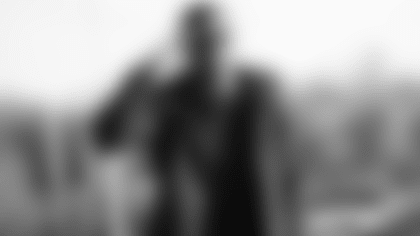Travis Hunter, the No. 1 football recruit in the country, could've played football at almost any college or university he wanted. He was committed to Florida State, and on signing day in December, he put three hats on a table in front of him: Auburn, Georgia and Florida State – three football powerhouses.
First, he tossed the Auburn hat to the ground. Next to the floor was Georgia, which went on to win the College Football Playoff Championship in Indianapolis a month later. He put on the FSU hat – then threw that away, too.
Someone threw him a hat with "JSU" on it, which he put on and announced he signed with Jackson State University, where he would play for "Coach Prime" – Deion Sanders – at one of the nation's 107 Historically Black Colleges and Universities.
"I was ecstatic," Robert Mathis, the Colts Ring of Honor defensive end and an alum of Alabama A&M, said. "I loved it. I loved every bit of it."
Mathis would know how an HBCU can shape a college football player into an NFL star. So can Colts All-Pro linebacker Darius Leonard, who attended South Carolina State – which, like Alabama A&M, is an HBCU.
"It's showing change," Leonard said. "It's showing that athletes all across the world, no matter if you're a five-star or one-star, they're committing to HBCUs to get the same thing that they're getting from a power five school."
Mathis and Leonard are part of a long line of NFL stars to play their college ball at an HBCU. Jerry Rice, Walter Payton, Deacon Jones, Art Shell, Steve McNair, Shannon Sharpe, Richard Dent and Michael Strahan, among many others, did too.
HBCUs may not have the national notoriety of football powerhouses or universities that compete in a power five conference (the ACC, Big Ten, Big 12, Pac-12 and SEC). Leonard estimated he only played on TV four or five times while in college. But for both Leonard and Mathis, attending an HBCU taught them what hard work looks like – and that, as Mathis put it: "If you've got aspirations to be elite, trust me, they'll find you."
"It made me ask for no handouts," Leonard said. "We didn't have the facilities, we didn't have all the great things but it taught me how to get everything from the ground up. You had to go out there and earn absolutely everything if you wanted to shine, you gotta put the work in in the offseason or put the work in by yourself to make sure you have that opportunity to play in the NFL.
"That just goes to show that HBCU guys, we're really getting it out of the mud, we're really just grinding day in and day out because we don't have the publicity behind us, we don't have the news and everybody playing on TV every weekend. We really gotta grind from Year 1 all the way through to Year 5 and you really gotta do it for the love of the game."
Leonard and Mathis both are grateful for their HBCU experiences not just because of football, but because of the sense of community they each had at South Carolina State and Alabama A&M, respectively.
Mathis figured he knew half the people on campus and likened homecoming to a big family reunion. Leonard had the same experience.
"Everybody at an HBCU knows everybody, so it feels like a big ol' family there and everybody's always together having a good time," Leonard said. "And I just feel like you're not going to get that same experience from a PWI (Predominantly White Institution). Like, there's nobody who's coming to dorm rooms, having a block party on a Tuesday just mingling together, kicking back all the way around, hanging out 24/7.
"And homecoming — homecoming is a different story. There's no PWI that is even close to a homecoming at an HBCU."
Leonard, though, said he didn't know anything about HBCUs before he attended one – there wasn't any education about them growing up, and they weren't presented to high schoolers in the way big in-state schools like Clemson and South Carolina were. He didn't know about the Orangeburg Massacre – which predated the Kent State shootings by two years (read more here) – until he went to South Carolina State (which is located in Orangeburg, a city of about 13,000 located about 40 miles from Columbia).
So for Leonard, he's vocal not only about his experience at South Carolina State because he's grateful for what he gained there, but to educate those around the country about HBCUs and history behind them.
"It's teaching me history – I didn't know HBCUs were formed because African-Americans weren't allowed to go anywhere else," Leonard said. "I didn't know all the things that went on in America. Like at South Carolina State, we talked about the Orangeburg Massacre where three guys — two students and a little kid that got killed on Feb. 3 (1968) — that is not even in the history books in South Carolina because it happened on an HBCU campus. That's wrong."
And that education is as important as ever in 2022, when there's been a disturbing, racist string of bomb threats against HBCUs over the last few months. Leonard believes those threats are happening because some people are seeing HBCUs succeed in shaping Black athletes, engineers, scientists and politicians – and the people calling in those bomb threats, like those who perpetrated the Orangeburg Massacre 54 years ago, don't want that.
So Leonard will continue to advocate, educate and promote on behalf of the institutions that gave him so much – and can give so much to those who attend them.
"I would tell (kids and high schoolers) to attend an HBCU one, for their heart, and for the experience of the grind," Leonard said. "If you want to go to a college that makes you feel like home, go to an HBCU because there's nothing but family people there and it's going to teach you how to be successful.
"I think that's the one thing that I really got out of it is, if you want to be successful, you had to work every day for it and that just taught me how to go about my life. If I want to be the best or I want to be whoever I want to be in life, I got to work absolutely hard as I possibly can to become what I want.
"And then once you got that mindset of I want to be the best, the HBCU experience is going to teach you how to love and appreciate what you have to how to make you better. So if you want to make your life better, you want to learn how to go and be a better person or be thankful for what you have and not want more, then go to an HBCU because if you really want to understand that lifestyle and go through and learn your history — because that's what it really is for me is learning your history and knowing your background."
And, as Mathis put it: "It's a priceless experience."














